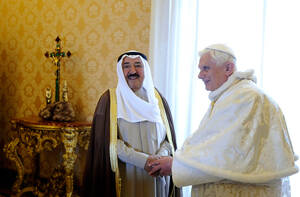In February, Kuwait’s newly formed al-Adala (“Justice”) Bloc introduced legislation to remove Christian churches and impose Islamic Shariah law. Party officials said later the legislation would not remove existing churches but would prohibit further construction of non-Muslim places of worship. The legislation also introduces Islam-inspired measures to fight corruption and “strengthen national unity.” On March 12 Bishop Camillo Ballin, the Italian-born apostolic administrator of Kuwait, called the proposals “out of step with the traditions of Kuwait, which seeks to be an open, tolerant country welcoming other religions besides Islam.” He said such proposals emerge “from ideologies which want to divide the world between Muslims and non-Muslims.” According to Bishop Ballin, al-Adala’s claims that there were more churches in Kuwait than needed by its Christian minority were untrue, taking account only of the small number of Christians who were ethnic Kuwaitis. “When religious life is assured, social life is also easier—so why can’t our foreign members have a place for worship?” the bishop asked.
Christian Restrictions in Kuwait
Show Comments (
)
Comments are automatically closed two weeks after an article's initial publication. See our comments policy for more.
The latest from america
Drama can teach us active listening and public speaking, yes; but on a deeper level, it can shape our spiritual disposition.
“Unless there is a change to current practice, our community is slowly being strangled,” said the Rev. Aaron Wessman, vicar general and director of formation for the Glenmary Home Missioners, a small Catholic order ministering in rural America.
For the past 34 years, Andrew Goh has ridden his scooter around Singapore to bring the Catholic faith to the elderly and housebound.
Los Angeles Archbishop José H. Gomez was one of several community leaders who joined to open the Family Assistance Program, aiding those affected by recent ICE raids.








